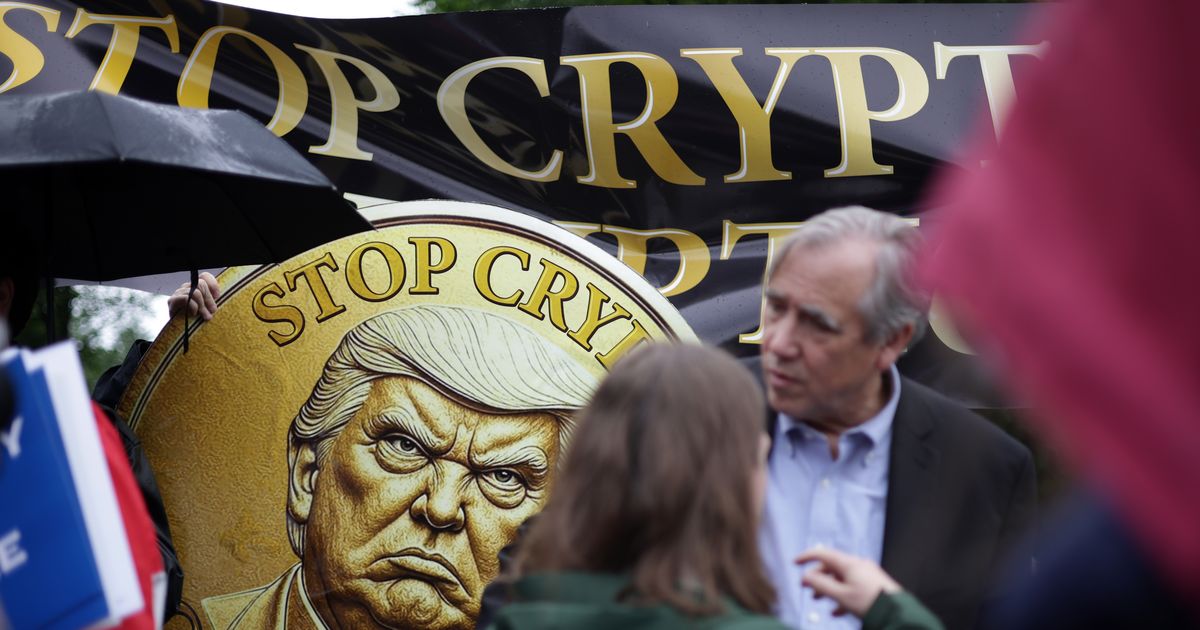A top House Democrat on Wednesday night opened a probe into the private dinner that President Donald Trump hosted for top investors in his meme coin, seeking to highlight the ethical and legal concerns raised by the president’s willingness to profit from his position.
Rep. Jamie Raskin, the top Democrat on the House Judiciary Committee, demanded Trump turn over the names of the guests who attended last week’s gala after pouring millions of dollars into the president’s crypto venture. The Maryland congressman also pressed the president to disclose what steps he used to determine the source of the funds used to purchase the meme coin, citing concerns that some of the money could have come from foreign governments seeking to influence the White House.
“Publication of this list will also let the American people know who is putting tens of millions of dollars into our President’s pocket so we can start to figure out what – beyond virtually worthless memecoins – they are getting in exchange for all this money,” Raskin wrote in a letter, which was first reported by the Washington Post.
Ethics experts and Trump’s political opponents say the meme coin dinner was the starkest example to date of Trump’s willingness to blur the lines between his for-profit business interests and his office.
Presidents have long participated in private dinners to raise funds for their political party or campaign, but the crypto dinner was different. Businesses affiliated with the Trump family – not political entities – profited from the coin sales, and buyers did not face the disclosure requirements and other legal constraints that apply to campaign donations.
Democrats are increasingly treating Trump’s business entanglements as a line of political attack, as his family expands their investments in crypto businesses.
“Profiting off the memecoin is just the latest in a bewildering gamut of schemes in which you and your family have profited after your return to office,” Raskin wrote in the letter, also citing the Trump family’s business deals in the Middle East.
On Tuesday, Trump Media & Technology Group, the parent company of Truth Social, said it planned to raise $2.5 billion from about 50 investors to purchase Bitcoin. Trump launched his $TRUMP meme coins days before he was sworn in. Meme coins are novelty digital currencies, often named for online jokes, that tend to show wild swings in price and “have limited or no use or functionality,” the Securities and Exchange Commission said in February.
An affiliate of Trump’s family business, the Trump Organization, operates the meme coin alongside a Delaware-registered company called Fight Fight Fight, run by longtime Trump ally Bill Zanker. Together, the two groups own 80% of the 1 billion Trump coins.
In April, the Trump-affiliated business announced that the 220 top holders of the meme coin would be rewarded with a “night to remember” at his golf club in Virginia. Since the coin’s debut, Trump-affiliated businesses have received $312 million from crypto sales and $43 million in total fees, according to a Post analysis of data through mid-May.
At the same time, the White House has sought to limit regulation of digital assets and pursued policies intended to legitimize cryptocurrencies, potentially increasing their value. Vice President JD Vance and Trump’s sons spoke at a Las Vegas gathering of bitcoin investors on Wednesday.
“We reject regulators,” Vance said during a keynote at the Bitcoin 2025 Conference.
Democrats have raised concerns that last week’s dinner allowed crypto investors to buy access to Trump.
No attendee better illustrates that in their view than Justin Sun, the founder of the crypto platform Tron, who revealed that he was the top buyer of Trump coins.
In 2023, the SEC announced civil charges against Sun, Tron and two other companies he owned, accusing them of fraudulently manipulating the market. After Trump won the election in November, Sun invested $75 million in World Liberty Financial. In February, shortly after Trump took office, the SEC asked a court to halt the 2023 case.
Many other purchases of Trump’s meme coin were shrouded in anonymity, making it impossible to track whether any of the money came from sovereign wealth funds or other agents of foreign governments. A Post analysis found the top purchasers of the coin included 28 “ghost wallets” that are virtually untraceable. Roughly half of the top 220 owners of the Trump meme coin have received coins from crypto exchanges such as Binance that say they reject customers from the United States, suggesting they could be foreign buyers, according to The Post analysis, which relied on data from cryptocurrency analytics firms Nansen and Arkham.
If the money came from foreign governments, the event could have violated the emoluments clause of the Constitution, which prohibits federal officials from accepting gifts or titles from foreign governments without permission from Congress, ethics experts and lawyers have said.
In his letter, Raskin also asked whether the White House or Trump’s companies checked to see if funds used to purchase the meme coins were linked to terrorist organizations, drug cartels, or other criminal enterprises or activities.
The White House has said the dinner poses no conflict of interest, because the president’s assets are in a blind trust managed by his sons. Asked whether the administration would commit to releasing a list of the dinner attendees, press secretary Karoline Leavitt said last week that she would “raise that question” internally. Leavitt argued that the event “is not a White House dinner” and that “the president is attending it in his personal time.”
Raskin’s probe is the latest in a string of Democrat-led efforts to shine a light on Trump’s crypto dealings. Last week, Rep. Maxine Waters (California), the top Democrat on the House Financial Services Committee, introduced a bill that would prevent the president, the vice president, lawmakers and their immediate families from owning a proportion of a digital asset that would allow them to unilaterally make changes to the asset.
Rep. Sean Casten, D-Ill., last week called on the Justice Department to investigate whether the dinner violates federal bribery laws or the emoluments clause.
“This is an orgy of corruption,” Sen. Elizabeth Warren, D-Mass., said at a news conference last week.







